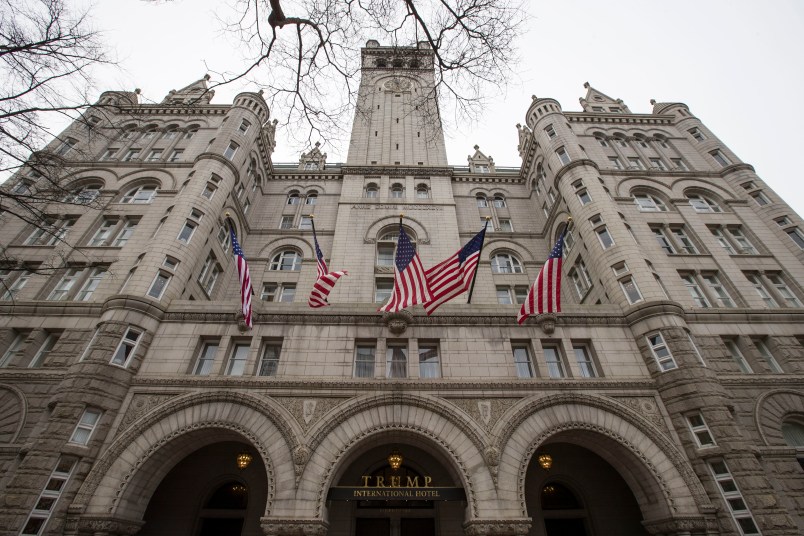WASHINGTON (AP) — Smithsonian museums are closed. There are no federal staffers to answer tourists’ questions at the Lincoln Memorial. And across the United States, national parks are cluttered with trash. Yet despite the federal government shutdown, a historic clock tower at the Trump International Hotel remained open Friday for its handful of visitors, staffed by green-clad National Park Service rangers.
“We’re open!” one National Park Service ranger declared around lunchtime, pushing an elevator button for a lone visitor entering the site through a side entrance to ride to the top of the 315-foot-high, nearly 120-year-old clock tower.
The Trump administration appears to have gone out of its way to keep the attraction in the federally owned building that houses the Trump hotel open and staffed with National Park Service rangers, even as other federal agencies shut all but the most essential services.
Amanda Osborn, a spokeswoman for the General Services Administration, which owns the building and leases it to the Trump Organization, said in an email that the shutdown exemption for the comparatively little-known clock tower was “unrelated to the facility’s tenant” — the Trump business. The agency says the law that put it in charge of the site obligates it to keep it open, even as federal Washington closes around it.
But the scene at the modest historic site at the Trump hotel building, where rangers often outnumber visitors, marked the latest episode in which Trump’s business interests have overlapped with the work of the federal government, creating at least the appearance of a conflict of interest.
A watchdog group, and frustrated tourists, questioned why a shutdown that had furloughed hundreds of thousands of workers and crippled many agencies was exempting a site within the Trump family’s business empire. The shutdown began Dec. 22, born out of an impasse between congressional Democrats and President Donald Trump over funding for a southern border wall.
Shutdown plans at the Interior Department, which includes the park service, mandated idling all but the most essential staff.
A watchdog group, Citizens for Responsibility and Ethics in Washington, filed a Freedom of Information Act request with the GSA, seeking documents explaining why the tower was open, how it continues to be funded, and any communications between the agency and the Trump Organization, the president’s company. Trump gave up day-to-day management of the firm in 2017 but continues to receive earnings from its operations.
“At the very least, this smells funny.” Said Noah Bookbinder, the group’s executive director.
“We have not seen a satisfactory basis for why one park service property is opened when no others are,” Bookbinder said. “This raises tremendous questions about whether this property that intersects with the president’s business is getting special treatment.”
CREW is also involved in a federal lawsuit targeting the Trump hotel that could become the first test of whether presidents are restricted by the U.S. Constitution’s emoluments provision, which bans gifts from foreign and U.S. state governments to federal officials.
Completed in 1899, the Romanesque-style former post office is on the National Register of Historic Places. The GSA pays for the National Park Service to run the building’s clock tower for visits by the general public. The tower initially closed to the public after the shutdown started. The GSA noticed then that the deal under which the park service staffs the site had expired, and renewed it, and the park service reopened the tower this week, the agency said.
The GSA, which helps other federal agencies operate, said it was using money from its building fund to keep the tower open and staffed.
Up at the top of the clock tower, a single tourist walked in during a 10-minute visit. She stared out the windows at some of the capital’s best views.
With other federal sites closed to tourists or unstaffed in the shutdown, ranger Rob Lorenz said in the tower, business has been picking up “as tour operators figure it out.”
A little more than a mile away at the Lincoln Memorial, a few hundred visitors hauled themselves up the stone steps and fell hushed as they wandered at the foot of the great statue of Abraham Lincoln. Husband and wife Kaicey and Neiman Manns, history buffs visiting from Roanoke, Virginia, expressed disappointment that Ford’s Theater and the national archives were both out for them, on this trip.
Even though the clock tower was one of the few federal landmarks open and staffed in Washington, Neiman Manns said, he’d pass.
“Me personally, the Trump Hotel? I don’t see that as a real part of the history of the United States,” he said.
Anna Menezes, a newly arrived tourist from Maringa, Brazil, wasn’t aware of the shutdown and wondered why federal museums were closed and the memorial unstaffed.
Told she could visit the tower at the Trump hotel, Menezes arched an eyebrow.
“Interesting,” she said.



